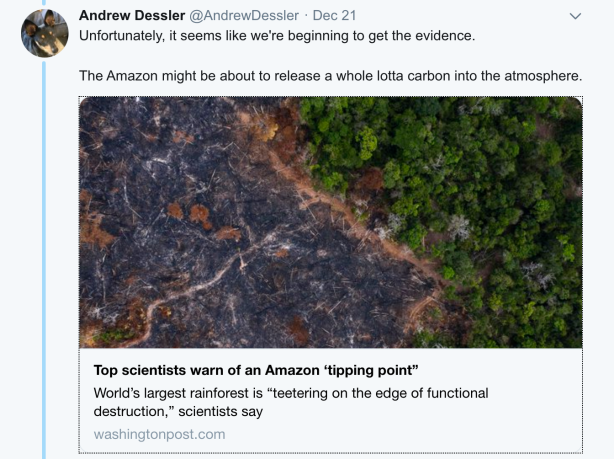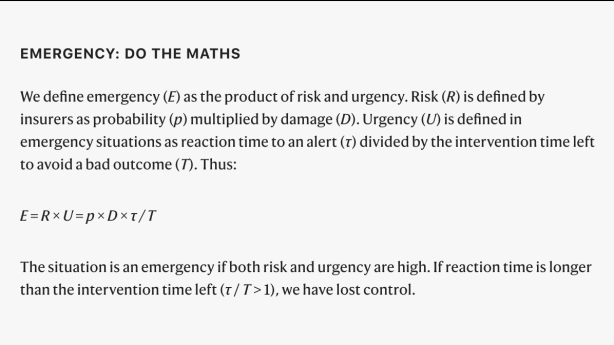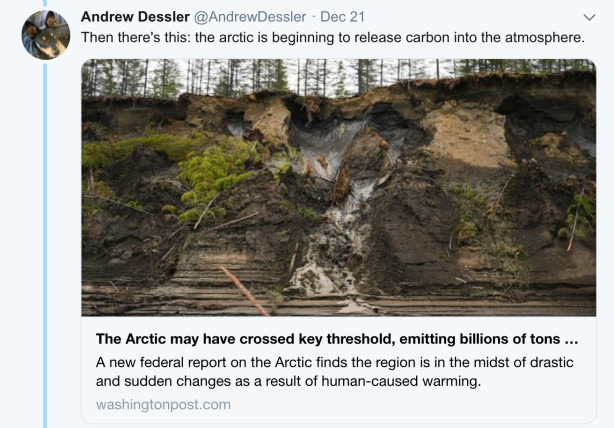This is from The Learning Planet a blog associated with The Climate Change Museum project. The article discusses the implications of ‘tipping points’ in relation to the language of ‘change’, ‘crisis’, ’emergency’ and ‘catastrophe’, all associated with climate and ecosystems.

A tipping point is a threshold that, when exceeded, can lead to large changes in the state of the system. In the case of global climate disruption, these changes could mean a cascade of feedback effects that could destroy conditions for thriving biodiverse life and human civilisation.

The terms for climate have very quickly moved from ‘climate change’ to ‘climate crisis’ to ‘climate emergency’. (Side note, this should always be read as ‘climate and ecological emergency’, with intersecting causes and impacts of ecocide, fossil fuel emissions and ecosystems collapse.)
Arguably, there has been a climate emergency since it was known that fossil fuels were altering the global carbon cycle and raising temperatures (1940s – 1960s). On the other hand, there are valid criticisms of the use of the term ’emergency’ because it calls to mind authoritarian governments cracking down on freedoms to implement extreme action.
This recent paper by seven authors in Nature, ‘Climate tipping points – too risky to bet against’, offers an equation to define ’emergency’.

The authors argue that the intervention time to prevent global tipping has shrunk to almost zero. However, there is still time – and an absolute necessity – to double down to limit the impacts of global tipping. The reality is that while rainforests dessicate and burn, they are also being deliberately cleared for agriculture, and that while fossil fuels cause ocean acidification, mass deaths of marine life and coral reef bleaching, several major countries are increasing their consumption of coal and drilling for more oil.
I wonder if ’emergency’ is not even a strong enough term for what is unfolding globally now, and perhaps ‘climate catastrophe’ is more appropriate. Most climate discourse in politics and economics places catastrophe at an indefinable point in the future. In the more problematic framings, this corresponds to ignoring that where ecosystems and people’s homes have been affected over past years (if not decades), climate catastrophe has already hit. Even advocates for urgent radical action, such as Greta Thunberg and Caroline Lucas, use phrases such as ‘if we want to avoid climate catastrophe…’. Although they give clear evidence that ‘climate change is here now’, the catastrophe is always still to come.
But, what is climate catastrophe if not this?

We need to start talking about the Emergency in relation to tipping points, which means understanding that this is a non-linear situation. If the climate impact of Australia’s raging forest fires is equivalent to all its national emissions, this puts a new light on the incrementalism of climate action.
There is room for more, urgent, research on the locations, potential scale and knock-on effects of tipping point changes. Also, there is much more room for tipping points to be reflected in frameworks for action, activist demands and climate communication. Given that climate discourses have been overwhelmed by forces pushing for delay, licence to drill, and denial of the science, this is going to be really hard. When we’re so used to hearing that climate communication must not alarm people, it is hard to know how to avoid alarm when an image search, simply of ‘Australia’ with today’s date yields this array of images.
Active hope continues to be the most essential emotion we can harness, but the situation is as grievous as could be imagined. If anyone has thoughts on how we can start talking more about this through the work of Climate Museum UK and in general, please share.
—–
ecoartscotland is a resource focused on art and ecology for artists, curators, critics, commissioners as well as scientists and policy makers. It includes ecoartscotland papers, a mix of discussions of works by artists and critical theoretical texts, and serves as a curatorial platform.
It has been established by Chris Fremantle, producer and research associate with On The Edge Research, Gray’s School of Art, The Robert Gordon University. Fremantle is a member of a number of international networks of artists, curators and others focused on art and ecology.
Powered by WPeMatico


